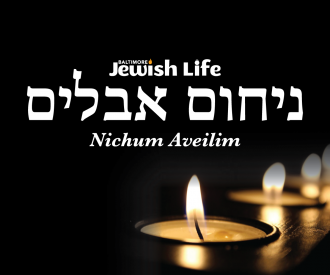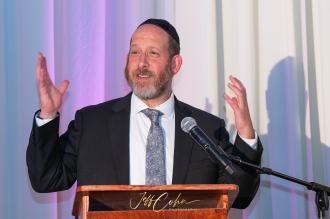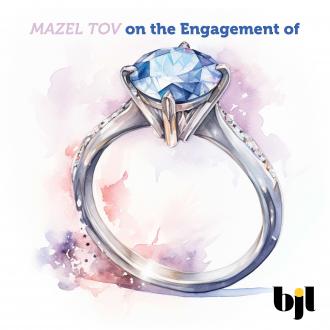Black Cats: We all know them. Black cats, broken mirrors, stepping on the cracks in sidewalks, rabbit’s feet and four leaf clovers. I’m talking about superstitions of course. All the major newspapers run daily horoscopes and the internet and bookstores are filled with advice on fortune telling and the occult. And some people really believe in this stuff and live their lives accordingly. Remember Nancy Reagan?
The Torah states clearly in Parshas Shoftim , Chap 18, verses 9 – 12, that we the Jewish people are to stay far away from these types of practices. “There shall not be found among you any one that makes his son or daughter pass through fire, no soothsayer, astrologer, enchanter, or sorcerer.” G-d considers all of these to be an abomination. Why shouldn’t we consult with astrologers or the tarot? The Torah answers us in verse 13, “ Tamim Teheyeh Im Hashem Elokecha– Complete you should be with Hashem your G-d.” The ways of the cult and the pagan are not for us. G-d tells us in verse 15 that “Navi Me’Kerbecha … Yakim L’cha…” “A prophet from among you I will raise up…” We Jews are assured that we don’t need to consult the horoscope, we have prophets for that.
What’s really going on here? Is staying around the house on Friday the 13th really so bad? Does walking across the street when I see a black cat make me a pagan cultist? And what does it mean to be “Complete with G-d”? And how does prophecy fit in with all this?
Way Back: First a disclosure; I am no expert on pagan and occult practices, nor do I have special knowledge regarding prophecy. I am going to deal with knowledge that is readily available to all and see what lessons we can derive from it. In our 21st century world most people associate things like horoscopes and Ouija boards as fun pastimes. The average person would never admit publically that they actually believe in this stuff. U.S. Senate candidate Christine O’Donnell learned the hard way in 2010 that being a card carrying Wiccan or witch as they used to be called, was not the best way to win voters confidence and support. Her candidacy went down in flames, not so much because people were afraid she might cast a spell on them for not voting for her, but because they thought she was strange.
But things weren’t always this way. For a large part of recorded history, many people gave credence to the occult and black magic. Life in the old days was like living in a “Harry Potter” novel. Decisions about life and business were decided not just on logic, but on the advice of magicians and astrologers and reading goat entrails. The Torah mentions the astrologers and magicians of Pharaoh, and witches were executed in Salem not that long ago, from a historical perspective.
Were people just more gullible back then? Are we so much wiser that we can’t be duped by all this seemingly crazy stuff? I mean none of this is real, right? And if it’s really all just make-believe and smoke and mirrors, why does the Torah tell us numerous times to stay away from it.
Keeping the Balance: Is your life controlled by dark forces and can you get into trouble by crossing them? The short answer is not anymore. Meaning, that our sages tell us that way back when there was a reality to black magic and the occult and astrology. These pagan practices did have power that could predict the future, at least in the short term, and under certain circumstances. Our rabbis teach that this is because G-d created the world to be balanced between good and evil. G-d allows for the existence of evil so that people will be able to choose to do good, and by making the right choices fulfill their potentials and earn ultimate reward in the World to Come. In the world of the generation that accepted the Torah at Mt. Sinai, and for almost a thousand years after them, G-d communicated to us through His prophets and the Urim’v’Tumim, the breastplate worn by the High Priest in the Holy Temple. We can imagine that believing in G-d and living a spiritually centered life was much easier back then, then it is for us now. When Moses speaks to you, and his face is radiating a holy light, you listen. That being the case, G-d allowed for the powers of impurity to function in real ways in order to maintain the balance and people’s free choice. So yes, there was a time when fortune telling was real and the Torah took it seriously and warned us to stay away. When the powers of prophecy were taken away from the Jewish people at the end of the second Temple era, the powers granted to the “dark side” were lessened commensurately. In our day and age this power is practically non-existent.
Molech: In verse 10 that I quoted before, the Torah warns against those that make their children pass through fire. This is a reference to the pagan practice known as Molech. There is much discussion in the Talmud and the commentators about what exactly constituted the Molech. Some say it means a parent actually had his child burned in the fire. Others say it means he walked them between two blazing flames in a symbolic ritual. Whichever one it was, I feel the explanation for the prohibition taught by Rabbi Shamshon Raphael Hirsch enunciates clearly the underlying problem the Torah is addressing.
Rabbi Hirsch paints a picture of the typical Molech adherent. He’s a family man, concerned with the welfare of his children. He knows life can be hard and the world a dangerous place to be. How can he ensure that his kids stay safe and healthy? And then it comes to him. He’ll make a “deal with the Devil” so to speak. He’ll offer one child to the Molech in return for safe passage for the others. He knows he can’t have it all, so half a cake is better than none. This is essentially what the Molech was. It was pagan man faced with overarching FATE. It was raw fear fed by an unknown future. It was one of many ways employed by man to try in some way to control the events of his life. And as we said before, there was real power granted to some of these practices.
G-d tells us that this is not our way. “Tamim Teyeh Im Hashem”- “Be COMPLETE with Hashem” … Rabbi Hirsch explains that this means we need to be completely devoted to Hashem, to G-d. Our whole self is to be given to Him. This level of devotion stems from our realization that every part of our lives, of our essences, is cared for and watched over by G-d. He responds to our actions and deeds. He knows us and loves us. He worries for us and teaches us how to live. He tests us, rewards us and corrects us when necessary. There is no such thing as being left to the fates. We are not adrift in some endless mindless sea that tosses us about without reason or cause. We don’t need to fear the future. We accept what life gives us. This is a philosophy that applies now, as much as it did 3,000 years ago.
The pagans believed that what they did made no difference to the blind powers that ruled their world. Their morality or lack thereof was not a determinant in life’s success. Anything was OK as long as they “paid” the “tax” to the Molech or whichever dark cult they pledged allegiance to. How liberating it must have seemed, but it was their downfall. The people of ancient Canaan were steeped in these practices and the immorality and lack of responsible, spiritually guided life that came in their wake. Their societies rotted and withered, until they were finally removed from the land with the coming of the Jewish people.
Prophecy: To return to our question above, what does prophecy have to do with this discussion? And to make the question sharper, if we are commanded to be Tammim, Complete with G-d and accept the future, not fear it, then why do we need prophets at all? Aren’t they there to tell us the future? To this question Rabbi Hirsch provides a beautiful insight. At the end of the verse where G-d tells us that He will establish prophets for us, it says” Aeylav Tishmeoon”, “and to him (the prophet) you should listen”. It doesn’t say “Ohso Tishalun”- “To him you should ask”. The prophets were not meant to be glorified futurists that we consult with on upcoming trends, or if you should invest in Apple or Samsung. They were not prognosticators. They were first and foremost teachers and guides. They were consulted to find out how one should live their lives according to G-d’s will. They served G-d, not us. We couldn’t buy them off with gifts or tribute. They gave us a living connection with our living G-d.
Nowadays: We have no prophets anymore. What’s a Jew to do? How are we supposed to know G-d’s will for us in the 21’st century? How can we know our mission in life? Our sages tell us that we must turn to the great Torah scholars and leaders of our generation for guidance. While none of them are prophets, their immersion in the sea of Torah has given them a G-dly view of life and events. We need to find teachers and advisers of deep Torah knowledge and faith in G-d to guide us and answer our questions. If we sincerely seek the truth from them, we may just find our own futures very bright indeed.
















